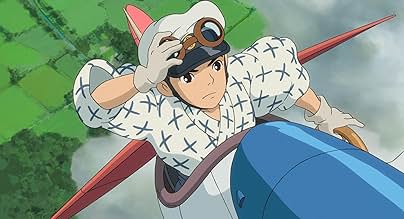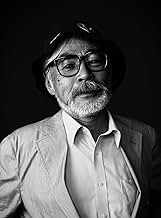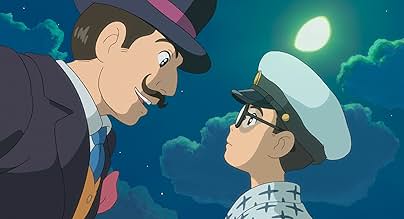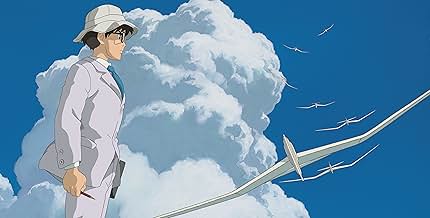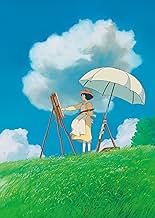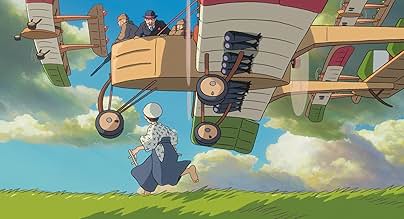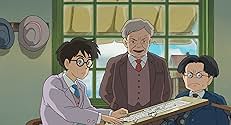अपनी भाषा में प्लॉट जोड़ेंJiro Horikoshi studies assiduously to fulfill his aim of becoming an aeronautical engineer. As WWII begins, fighter aircraft designed by him end up getting used by the Japanese Empire agains... सभी पढ़ेंJiro Horikoshi studies assiduously to fulfill his aim of becoming an aeronautical engineer. As WWII begins, fighter aircraft designed by him end up getting used by the Japanese Empire against its foes.Jiro Horikoshi studies assiduously to fulfill his aim of becoming an aeronautical engineer. As WWII begins, fighter aircraft designed by him end up getting used by the Japanese Empire against its foes.
- 1 ऑस्कर के लिए नामांकित
- 26 जीत और कुल 54 नामांकन
Hidetoshi Nishijima
- Honjô
- (वॉइस)
Jun Kunimura
- Hattori
- (वॉइस)
Stephen Alpert
- Castorp
- (वॉइस)
- (as Steve Alpert)
Morio Kazama
- Satomi
- (वॉइस)
Joseph Gordon-Levitt
- Jirô Horikoshi
- (English version)
- (वॉइस)
John Krasinski
- Honjô
- (English version)
- (वॉइस)
Emily Blunt
- Nahoko Satomi
- (English version)
- (वॉइस)
Martin Short
- Kurokawa
- (English version)
- (वॉइस)
Stanley Tucci
- Caproni
- (English version)
- (वॉइस)
Mandy Patinkin
- Hattori
- (English version)
- (वॉइस)
Mae Whitman
- Kayo Horikoshi
- (English version)
- (वॉइस)
- …
फ़ीचर्ड समीक्षाएं
... maybe that's Miyazaki's secret, finally unveiled in his latest movie: "The Wind Rises".
You know, it's been three months since I discovered his work and I never had to experience any kind of disappointment. And although I got used to his unequaled capability to catch my eyes and my heart, some of his movies really hit a sensitive chord, like "Kiki" or "Ponyo" and perhaps the action-less moments of "Nausicaa".
But I can't really describe the effect "The Wind Rises" had on me. For one thing, I'm glad I'm discovering it late because it's the film that best captures Miyazaki's love for airplanes. His passion never went unnoticed; how could it be? Almost half of his movies involve airplanes, flying devices or stunts in the air, but there has always been an element of fantasy that distracted from the personal approach he had to flying, even in "Porco Rosso" which was the most explicit homage to the Italian contribution to aviation.
But "The Wind Rises" made me realize how fantasy is perhaps the sincerest medium to convey passionate matters, because -to put it simply- it's all about dreams and vision that wait for the right wind to carry them a little and give them that extra push they need for flying. "The wind has risen, one must try to live" is the excerpt from Paul Valéry's poem that novelist Hori Tatsuo used as an inspiration for a tragic romance, and who else than Miyazaki could explore such a story, he who had dedicated all his life to things in the air, from feelings to plain things (pun intended). One thing he had in common with Jiro Horikochi, the main protagonist.
The film deals with planes in a way that has never been touched by Miyazaki, it's not about flying but about the dreams of flying, their very blossoming in the fertile soil of a man's mind. In fact, the film is less devoted to planes than to the devotion of a boy, then a man, who designed the Imperial Army's most notorious aircraft. They were used in the war but the film has a point to make about war. Miyazaki believes in Jiro's humanism and expresses it through very riveting dreamy moments. Jiro is a dreamer, literally, and whenever he dreams, he meets his all-time idol, Italian Giovanni Caproni. Together they share their views about planes, their universal appeal and sadly their belligerent uses (or misuses).
But don't get it wrong, just because it's in the poetic vicinity of Miyazaki's usual works, the film is as realistic as any serious biography picture, although fictionalized with a romance adapted from the "Wind Has Risen" novel and many events that struck Japan from the Great Depression to Kanto's earthquake, and last but not least, the war. Jiro is portrayed as a witness of his time who must adapt to the evolution of society, a two-pace society with a feudal heritage yet trying to match the Meiji dream. The most emblematic image is the prototype being pulled by ox. This is Miyazaki's most personal film, it has Japan, it has humanism and well, it has planes.
And to give you an idea, this film is far more revealing about Jiro than "A Beautiful Mind" with John Nash. There was something so catching in Jiro's passion, in the way he kept focused on his job. I could even feel I was venturing into his mind as if Miyazaki met him in his dreams before making this film. I have no clues about planes but I do love a movie about passion, this is a film about a man who loves planes by a man who loves them. To judge a good biopic, I guess it all comes to the area of passion driving the maker. Having thick glasses, Giro could never fly but Caproni almost rhymes with epiphany, the Italian icon tells him that he can't even fly a plane, but there's just something far more exhilarating than creating. And Miyazaki wouldn't disagree.
The heart of the film is centered on the romance between Jiro and a gentle tuberculosis stricken girl, like Hori's wife who inspired the novel. And whenever they meet, the wind rises and make their encounter possible. Air is our universal heritage, in the film, it reunites people and give a proper meaning to their life. This air so fragile in "Nausicaa", this air that symbolizes peace in a world that prepares to war and about which the post-apocalyptic Nausicaa warned us. Miyazaki signs his best film. I enjoyed it so much it could have been twice longer, to the post-war period time.
But the film culminates with the tragic ending and doesn't show much of the war. It is anticlimactic to use a technical term, but I guess it's a fine ending because there wasn't much to add about Jiro once he designed the prototype, once the plane that started as a concept hidden behind a fish bone became a technological marvel. The film is dedicated to the engineer and to the poet. And the verse "The Wind Rises, one must try to live" is so beautiful it could work as an epitaph for Hayao Miyazaki, summing up his best contribution to animation: inviting us to dream, to pursue our dreams and to take them seriously like a poet, a bit like an engineer, always like a dreamer.
This is one of the greatest animated movies of recent times, and given how critical I was about "Frozen", I was shocked that it won the Oscar. From what I read, there was some controversy surrounding the peaceful nature of Jiro, a sugarcoating of the war and an overuse of smoking. I'd say "The Wind Rises" deserved better than being beaten by a film that tried to play the "socially relevant" card to death. But the masterpiece flies over "Frozen" like a zeppelin over a fish bone.
You know, it's been three months since I discovered his work and I never had to experience any kind of disappointment. And although I got used to his unequaled capability to catch my eyes and my heart, some of his movies really hit a sensitive chord, like "Kiki" or "Ponyo" and perhaps the action-less moments of "Nausicaa".
But I can't really describe the effect "The Wind Rises" had on me. For one thing, I'm glad I'm discovering it late because it's the film that best captures Miyazaki's love for airplanes. His passion never went unnoticed; how could it be? Almost half of his movies involve airplanes, flying devices or stunts in the air, but there has always been an element of fantasy that distracted from the personal approach he had to flying, even in "Porco Rosso" which was the most explicit homage to the Italian contribution to aviation.
But "The Wind Rises" made me realize how fantasy is perhaps the sincerest medium to convey passionate matters, because -to put it simply- it's all about dreams and vision that wait for the right wind to carry them a little and give them that extra push they need for flying. "The wind has risen, one must try to live" is the excerpt from Paul Valéry's poem that novelist Hori Tatsuo used as an inspiration for a tragic romance, and who else than Miyazaki could explore such a story, he who had dedicated all his life to things in the air, from feelings to plain things (pun intended). One thing he had in common with Jiro Horikochi, the main protagonist.
The film deals with planes in a way that has never been touched by Miyazaki, it's not about flying but about the dreams of flying, their very blossoming in the fertile soil of a man's mind. In fact, the film is less devoted to planes than to the devotion of a boy, then a man, who designed the Imperial Army's most notorious aircraft. They were used in the war but the film has a point to make about war. Miyazaki believes in Jiro's humanism and expresses it through very riveting dreamy moments. Jiro is a dreamer, literally, and whenever he dreams, he meets his all-time idol, Italian Giovanni Caproni. Together they share their views about planes, their universal appeal and sadly their belligerent uses (or misuses).
But don't get it wrong, just because it's in the poetic vicinity of Miyazaki's usual works, the film is as realistic as any serious biography picture, although fictionalized with a romance adapted from the "Wind Has Risen" novel and many events that struck Japan from the Great Depression to Kanto's earthquake, and last but not least, the war. Jiro is portrayed as a witness of his time who must adapt to the evolution of society, a two-pace society with a feudal heritage yet trying to match the Meiji dream. The most emblematic image is the prototype being pulled by ox. This is Miyazaki's most personal film, it has Japan, it has humanism and well, it has planes.
And to give you an idea, this film is far more revealing about Jiro than "A Beautiful Mind" with John Nash. There was something so catching in Jiro's passion, in the way he kept focused on his job. I could even feel I was venturing into his mind as if Miyazaki met him in his dreams before making this film. I have no clues about planes but I do love a movie about passion, this is a film about a man who loves planes by a man who loves them. To judge a good biopic, I guess it all comes to the area of passion driving the maker. Having thick glasses, Giro could never fly but Caproni almost rhymes with epiphany, the Italian icon tells him that he can't even fly a plane, but there's just something far more exhilarating than creating. And Miyazaki wouldn't disagree.
The heart of the film is centered on the romance between Jiro and a gentle tuberculosis stricken girl, like Hori's wife who inspired the novel. And whenever they meet, the wind rises and make their encounter possible. Air is our universal heritage, in the film, it reunites people and give a proper meaning to their life. This air so fragile in "Nausicaa", this air that symbolizes peace in a world that prepares to war and about which the post-apocalyptic Nausicaa warned us. Miyazaki signs his best film. I enjoyed it so much it could have been twice longer, to the post-war period time.
But the film culminates with the tragic ending and doesn't show much of the war. It is anticlimactic to use a technical term, but I guess it's a fine ending because there wasn't much to add about Jiro once he designed the prototype, once the plane that started as a concept hidden behind a fish bone became a technological marvel. The film is dedicated to the engineer and to the poet. And the verse "The Wind Rises, one must try to live" is so beautiful it could work as an epitaph for Hayao Miyazaki, summing up his best contribution to animation: inviting us to dream, to pursue our dreams and to take them seriously like a poet, a bit like an engineer, always like a dreamer.
This is one of the greatest animated movies of recent times, and given how critical I was about "Frozen", I was shocked that it won the Oscar. From what I read, there was some controversy surrounding the peaceful nature of Jiro, a sugarcoating of the war and an overuse of smoking. I'd say "The Wind Rises" deserved better than being beaten by a film that tried to play the "socially relevant" card to death. But the masterpiece flies over "Frozen" like a zeppelin over a fish bone.
Aviation has always been a key element of the Studio Ghibli films; from the flying broomstick in Kiki's Delivery Service to the airborne armies in Howl's Moving Castle. So for Hayao Miyazaki's reported swan-song to focus on the development of aeroplane design is no surprise. A fictionalised biopic of designer Jiro Horikoshi, The Wind Rises is a stunning achievement, an animated film that uses the medium to tell a compelling, highly emotional story that has appeal for children and adults alike. Horikoshi's designs were used during World War 2, and that detail may make The Wind Rises unpalatable to some. But Miyazaki's films have never focused on battle-lines, but on the personal stories involved, and The Wind Rises gains power from the balancing of the beauty of the designs against the knowledge that the purpose for which the designs will be used leads to death and unhappiness. It's a bitter-sweet paradox, and one that many directors would sweep under the carpet. Instead, Miyazaki puts Horikoshi's dilemma centre-stage, and depicts the designer's angst as he finds himself immersed in industrial and international intrigue while he attempts to keep his own thinking pure. A subplot, invented for the film, relates how Horikoshi's work life is informed by his chaste romance with Naoko, a woman with tuberculosis who won't marry until she recovers. Horikoshi's dreams take flight while his day-to-day reality struggles to leave the ground behind. The Wind Rises stirs up sensational aerial dream sequences, but also captures the bleakness of life on the ground, as Tokyo recovers from a devastating earthquake. Horikoshi and Naoko journey to the Magic Mountain resort in an effort to address her physical malaise, and their interaction with a mysterious German spy, beautifully voiced by Werner Herzog, sketches out the sinister world of warmongering that forms the backdrop to their romance. Studio Ghibli films have always been beautiful to watch, and The Wind Rises excels in every frame. But the overriding message, about the role of a gifted individual to overcome the constraints of society, is just as beautifully wrought; The Wind Rises is required viewing for anyone who wants to have their spirits lifted and soar like the wind for two blissful hours.
The announcement of this film was a pleasant surprise after Ponyo and From Up on Poppy Hill, which both had simple, childish plots. Few films in Japan have tackled the lives of imperial period heroes; the ghosts of the 1960s urge people to denounce what really happened in that time and memorialize an imaginary anti-war movement, for example in this year's film "Shounen H". For Miyazaki to choose a subject like this showed that he was really going for a huge challenge. Miyazaki is of course anti-war and environmentalist. But Ghibli films are never negative. What sort of positive image of the Zero bomber inventor would Miyazaki produce?
The result is astounding. As everyone has noted, this is not a children's movie. It's complex, so it doesn't have the epic sense of Miyazaki at his best, but history and adulthood are just as complex, and Miyazaki does justice to both. The film indeed stays positive throughout, by showing from start to finish how everyone wishes they themselves would behave, rewarding the viewer with virtue and beauty, but without being condescending about the hardships of real life. In a sense, the film is about the "importance of dreams", but it's also about what it means to be a dreamer in real life, and how our highest fantasies can be turned into beauty if we put our minds to it. The cartoon medium is put to full, extravagant use in dream sequences that merge right into the narrative. Certain elements at the end of the film leave the obvious unsaid in a peculiarly Japanese and fulfilling way. The most classic films of Japan, like the great works of Akira Kurosawa and Yasujiro Ozu, say something profound about the meaning of life, and Kaze Tachinu deserves a place among those ranks.
The result is astounding. As everyone has noted, this is not a children's movie. It's complex, so it doesn't have the epic sense of Miyazaki at his best, but history and adulthood are just as complex, and Miyazaki does justice to both. The film indeed stays positive throughout, by showing from start to finish how everyone wishes they themselves would behave, rewarding the viewer with virtue and beauty, but without being condescending about the hardships of real life. In a sense, the film is about the "importance of dreams", but it's also about what it means to be a dreamer in real life, and how our highest fantasies can be turned into beauty if we put our minds to it. The cartoon medium is put to full, extravagant use in dream sequences that merge right into the narrative. Certain elements at the end of the film leave the obvious unsaid in a peculiarly Japanese and fulfilling way. The most classic films of Japan, like the great works of Akira Kurosawa and Yasujiro Ozu, say something profound about the meaning of life, and Kaze Tachinu deserves a place among those ranks.
This film is totally different from Miyazaki's other films and I personally think, like what he's mentioned, a message to to world about how he looks at the war, war machines , peace, love and living. As I am a Taiwanese, who has once colonized and ruled by Japanese during the second world war, how Japanese coped with the war topic is always sensitive. However, what I saw in this film is truly reflecting that Miyazaki is peace loving and his point of view on war, life and love. He depicted about the beauty of dreams and surviving. You can see that everyone in this film try every hard to live, even though the time is hard and forced to strike a balance between dreams and reality. However, they are self fulfilling. So who is to blame? who ruined their lives and dreams? Those who leads them to the war to blame.
In short, the film perfectly shows how the director's been telling in almost every his masterpiece but in a personally way, to the audience. Just like a final message he would like yo transmit to the world. I felt overwhelmed by the film and sad that he decided to retired. Please go to watch this film and you will do feel the courage to live hard and live well.
In short, the film perfectly shows how the director's been telling in almost every his masterpiece but in a personally way, to the audience. Just like a final message he would like yo transmit to the world. I felt overwhelmed by the film and sad that he decided to retired. Please go to watch this film and you will do feel the courage to live hard and live well.
Miyazaki's swan song, most likely. It's an animated biopic of Jiro Horikoshi, a Japanese aircraft engineer who developed the Zero, the plane which would eventually bomb Pearl Harbor and do kamikaze attacks in WWII. The man himself was a pacifist (at least according to this film). Most of the film just deals with the man's love for flight, which obviously makes the story very dear to Miyazaki. In fact, a good portion of the film takes place in Horikoshi's dreams, where he can invent any crazy contraption. First and foremost, the film is gorgeous. Though it mostly deals with the real world, it finds the beauty in it. As good as the film is, it isn't one of Miyazaki's best. It's a little long-winded and slow (definitely don't take your kids to it, even if they're big Ghibli fans). Miyazaki kind of neuters the militaristic history of Japan at that time. You can feel some terrible stuff going on in the background, but, outside of the Germans, whom our hero visits at one point, all the characters whom we meet are perfectly nice people. I would have liked a more detailed picture of history at the time. Also, the romance that is depicted in the film, which is entirely invented, is a tad too maudlin (though it is quite nice up front). And, though I won't hold it against the film itself, the English language dub is awful. This may be due to the film's specific, Japanese setting, but I really felt the voice actors were just dull as Hell. I hate to say it, but Joseph Gordon-Levitt in the lead role is the worst. The least offensive performances come from Martin Short and Mae Whitman (the latter is a professional voice actress who is great on Avatar: The Last Airbender, though she is best known for her role as Michael Cera's dull girlfriend Ann on Arrested Development). I wish I had just seen the subtitled version instead (it was playing here, but at an inconvenient theater). I might like the film better seeing it subtitled. All those criticisms don't amount to too much, though. It's a wonderful film.
क्या आपको पता है
- ट्रिवियाHuman voices are largely used as sound effects, such as engine roars and earthquake sounds.
- गूफ़After Jiro tells Nahoko that he's finished designing his plane, he falls asleep. Nahoko removes his glasses and places them on the floor behind their heads. In the next shot, from behind their heads, there are no glasses on the floor.
- क्रेज़ी क्रेडिट[A quote in French from a poem by Paul Valéry that appears as a caption at the start of the movie.] The wind is rising! We must try to live!
- कनेक्शनEdited into Miyazaki Dreams of Flying (2017)
- साउंडट्रैकHikouki-gumo
(Contrails)
Written by Yumi Matsutôya (as Arai Yumi)
Performed by Yumi Matsutôya (as Arai Yumi)
Courtesy of Toshiba EMI (Universal Music Japan)
टॉप पसंद
रेटिंग देने के लिए साइन-इन करें और वैयक्तिकृत सुझावों के लिए वॉचलिस्ट करें
विवरण
बॉक्स ऑफ़िस
- बजट
- $3,00,00,000(अनुमानित)
- US और कनाडा में सकल
- $52,09,580
- US और कनाडा में पहले सप्ताह में कुल कमाई
- $3,13,751
- 23 फ़र॰ 2014
- दुनिया भर में सकल
- $13,70,90,189
- चलने की अवधि
- 2 घं 6 मि(126 min)
- रंग
इस पेज में योगदान दें
किसी बदलाव का सुझाव दें या अनुपलब्ध कॉन्टेंट जोड़ें







